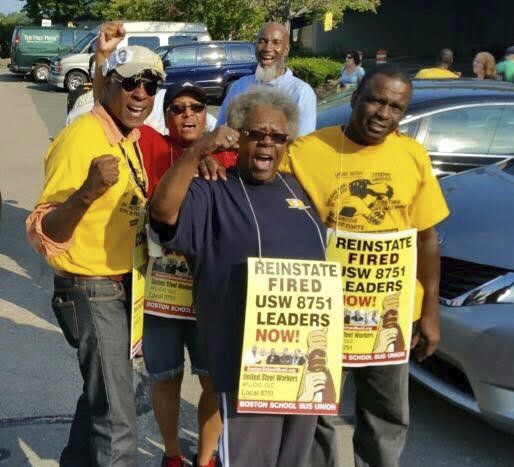

Team Solidarity members at a Boston bus driver yard rally are from left to right: Samir Stanley, Angie Louis Charles, Georgia Scott, Jean Brazile (behind Georgia), Robert Salley.WW photo: Stevan Kirschbaum
Chicago — For decades now, going back to the Cold War era when most left-wing leaders were purged from the U.S. labor movement, unions have practiced what is called “business unionism.” Workers have tended to view their unions as a service provider: they pay their dues every month and the leadership “delivers the goods,” i.e., better wages and benefits, pensions, grievance handling and so forth. Dues are likened to attorneys’ fees.
In the past, union leaders could make good on their promises by not rocking the boat, not striking and thus not interrupting the flow of profits. Words like “jointness” and “partnership” defined the cooperation between labor and capital. Many rank-and-file workers grew apathetic about their unions.
This trend has eroded the “social” or “old-school unionism” identified with the militant class battles of the 1930s, when sit-down strikes and other struggles forced hitherto intransigent bosses to recognize unions and union density grew to over 35 percent countrywide.
Now, union members make up only 12 percent of all workers, with the percentage in the private sector even smaller. In the 1930s, unions were engaged with the broader social movements of their time, from the case of the Scottsboro Nine to the fight for jobs to standing with Spanish anti-fascists. Today, many unions limit themselves to the economic concerns of their own members and, even on that front, are quick to sell concessionary contracts as “the best we’re going to get without a strike.”
There are many signs, however, that this negative trend is being reversed. One sign was the record participation in the recent Labor Notes conference in Chicago. This biennial conference, sponsored by a monthly paper of the same name, is an opportunity for militant union activists who are looking to make a break with business unionism to network. Well over 2,000 people attended from around the country, of all nationalities and occupations, including many young low-wage workers. There were over 100 international guests.
The conference hosted over 125 workshops. Those on Latin America, Asia, Palestine, allying with Black Lives Matter, fighting LGBTQ oppression, young workers and “What is socialism” were well attended. Autoworkers, transit workers, health care workers, teachers and other workforce sectors had lively discussions.
Team Solidarity members at a Boston bus driver yard rally are
from left to right: Samir Stanley, Angie Louis Charles, Georgia
Scott, Jean Brazile (behind Georgia), Robert Salley.
WW photo: Stevan Kirschbaum
Leaders of Steelworkers Local 8751, the Boston School Bus Drivers, rocked the house when they told other transit workers of their victory against Veolia/Transdev.
Autoworkers raised almost $700 for their superexploited counterparts in Colombia and Brazil who have been unjustly fired. In a moving display of solidarity, the Brazilian autoworkers present gave their half of the collection to support the organization of injured General Motors workers who have been fired in Colombia.
Many at the conference sported shirts and buttons supporting Bernie Sanders. While Sanders’ brand of socialism does not go beyond capitalist reforms, the fact that many unions are bucking the Democratic Party establishment and backing a self-proclaimed socialist is another sign that a section of the labor movement is looking to return to its radical roots. There were many militant young workers at the conference wanting to learn more about socialism, beyond what Sanders is talking about.
Workers looking to revive labor’s fighting tradition have wonderful models to study. The Boston School Bus Drivers union has not only beat Veolia/Transdev, but in the midst of the fight of their lives the membership engaged in solidarity actions and passed resolutions to support the oil strike, locked-out steelworkers, the LGBTQ community, Dr. Aafia Siddiqui, Mumia Abu-Jamal, the Rev. Edward Pinkney, Verizon workers and others.
Another important workers’ organization is the Southern Workers Assembly, which is bringing together union and worker activists throughout the U.S. South on an anti-capitalist and anti-racist basis to unionize this exploited region of the country.
A good theme for the emerging movement towards social unionism is “If you don’t have a union, fight to organize one. If you have a union, fight to make it fight.”
Download the PDF Black and white version In over 1,000 U.S. cities Workers mobilized for…
Adapted from the author’s presentation at a May 4 webinar organized by the International Manifesto…
The following is part one of a talk given by the author to a meeting…
The island nation of Cuba has consistently struggled with one economic barrier above all others:…
Dozens of activists responded to a call by the United Farm Workers (UFW) for an…
In its ongoing genocidal campaign against the Palestinian people, Israel used drones May 2 to…